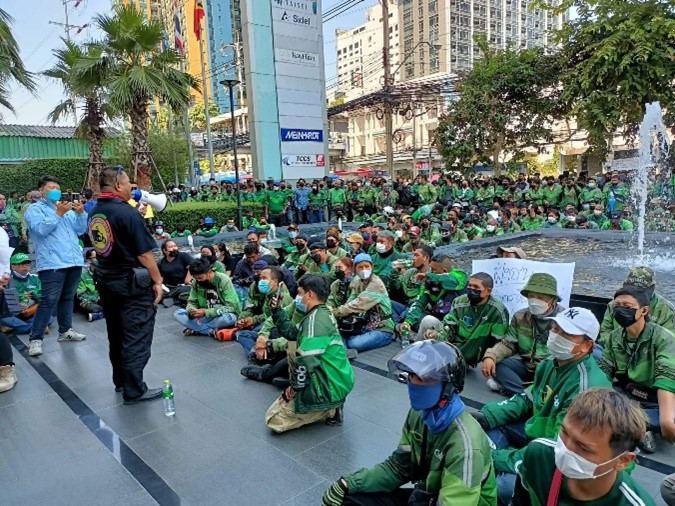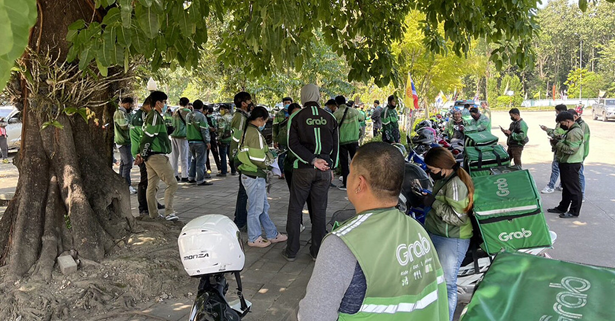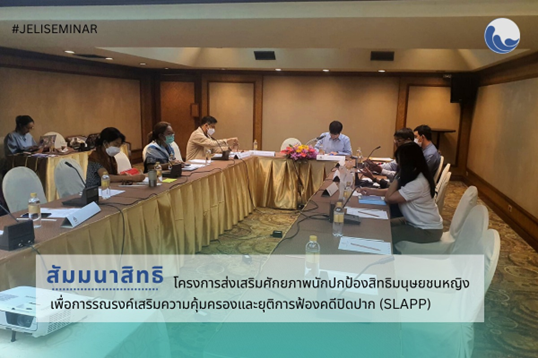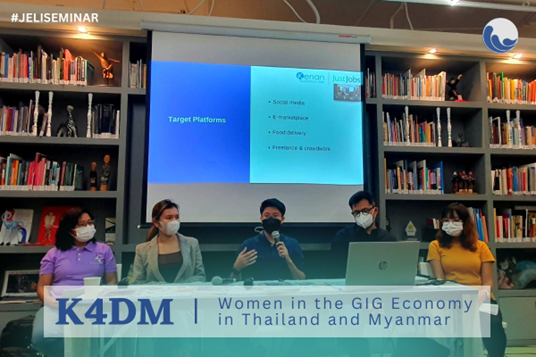As the New Year approaches, the situation of delivery riders’ rights remains an issue of concern. This past November, rider groups in Bangkok and surrounding provinces came out in protest of Grab’s unfair employment policies, demanding policy changes from the company as well as government assistance and oversight on the matter. The company stated that they would consider the demands and reply within 14 days, but no changes have occurred.
Among JELI’s work for the month of November was a seminar held to strengthen the capacities of women activists and labor leaders who are facing SLAPP lawsuits. Participants of this seminar explored various legal and international human rights mechanisms which can be utilized for their case. Moreover, a representative of JELI participated in a discussion on 29 November and presented our research on the rights of domestic workers and massage therapists working through online platforms, and recommendations on how to improve their working conditions.
This month, JELI plans to close off the year with a capacity building workshop on digital technology for delivery riders on 11 – 13 December. Don’t forget to follow JELI’s social media pages to keep up to date on our work!
News
Grab delivery riders gathered to demand an end to unfair employment practices


3 November 2022 – Grab riders from the “Grab Move Fast, We Help Each Other” Group (Grab เคลื่อนที่เร็วเราช่วยกัน) gathered in front of Central World before moving to Thanapoom Tower, causing a road closure in front of the Grab Thailand office. There were an estimated 500 participants, with speakers taking turns sharing the various problems they face at work. There were also calls among the riders to hold a system-wide strike to interrupt orders and put pressure on the company.
The group of demonstrators demanded representatives from the company to come down and discuss the problems the riders were reflecting on, including:
- Booking process – There had been changes to the way work was distributed to riders. Previously, jobs had just been sent to their account, but now riders had to reserve shifts of 2 – 3 hours per locale (for example 12:00-03:00 in Bang Kapi district). With this new system in place, they cannot work outside of the reserved time and district.
- Work cycles with a limited quota – Riders who do not reserve their shifts on time are not able to work. If they reserve shifts at times with low demand (such as 1 a.m. or 3 a.m.), they barely receive orders if any at all meaning that they earn less compensation. Moreover, they are put at risk of getting their account shut down because their rate of work does not meet the system’s quota.
- Batch orders – Batch orders are when riders must take more than 1 order for one trip. Aside from the main order, they must also deliver another one or two on the way. With this system in place, riders receive less compensation for the total amount of orders, and often face angry customers for slow delivery.
- Cost per trip – This refers to the compensation riders receive for one completed job, which has been steadily decreasing (in contrast to the increasing service fees that the company charges customers). This causes riders to rush to receive multiple jobs per day or work longer hours. Working in a rush or for extended periods of time also causes riders to rest less, increasing the risk of road accidents.
The riders made 3 demands, as follows:
- Suspend or cancel the booking system to reserve work shifts
- Batch orders should only be made when orders are coming from the same restaurant or ones in close proximity to each other. Riders should also have the power to decide whether or not they want to take these batch orders.
- Lock in a minimum rate that a rider will receive in any given area. Do not take any more deductions from riders, but collect more money from customers instead.
After receiving no response from the company, the leader of “Grab Move Fast, We Help Each Other” Group led the demonstrators to the Channel 3 Headquarters. This was a strategic move to communicate with the public about their fight for fair employment. Later in the day, Grab company released a statement saying that they would consider the demands and notify the riders within 14 days. With this, the demonstrators dispersed in the evening.
Riders throughout Thailand held parallel protests in Chonburi, Kanchanaburi, and Chiang Rai demanding higher compensation rates and an end to batch orders

3 November 2022 – Grab riders in Chonburi, Kanchanaburi, and Chiang Rai held parallel protests to the one in Bangkok, demanding higher compensation rates and an end to the batch order system. They also demanded that the government must ensure that their demands for fair compensation and better working conditions are met. The riders mobilized to various government offices in their respective provinces to make sure that their demands were heard by those in power.
Thank you to Prachatai for providing coverage and photos of the demonstrations.
For more information: https://prachatai.com/journal/2022/11/101271
Projects Happening This Month
Workshop on digital technology and applications: GLP-POWER project to empower and inspire riders
11 – 13 December 2024 – JELI will be organizing a workshop on digital technology and applications at the Ratchanee Jamcharat Convention Center, as part of the GLP-POWER project to empower and inspire riders.
The workshop will focus on giving riders access to technology that will enhance their ability to demand and fight for their labor rights. This includes providing a space and tools for riders to holistically manage their emotions and mental wellbeing.
Follow JELI’s Facebook and Twitter for more details on this event.
Workshops and Seminars
Capacity Building Workshop for Women Human Rights Defenders and Labor Leaders: Campaigning for Protection and an End to SLAPP Lawsuits

23 November 2022 – The Just Economy and Labor Institute (#JELI) organized a capacity building workshop for human rights activists and labor leaders facing SLAPP lawsuits. The session focused on campaigning strategies to enhance their protection and fight for an end to their SLAPP cases. It was held from 8.30-16.30 in the Phayathai Conference Room on the 2nd Floor of the Asia Hotel in Bangkok.
During the morning session, the human rights defenders, labor activists, and trade union representatives shared their stories of struggling for the labor rights and welfare that they are entitled to, and which are within public interest. They faced retaliation in the form of prosecution in both civil and criminal SLAPP lawsuits from capitalists and from the state. Activists are burdened with wasted time and expenses as a result.
In the afternoon session, experts came in to provide information on campaigning to stop SLAPP lawsuits. They reflected on lessons learned and explored legal mechanisms and international human rights instruments that may be utilized to protect human rights and prevent the law from being used as a tool to suppress the voices of workers and civil society.
Follow up full report on JELI’s Facebook and Twitter
KNOWLEDGE MARKETPLACE – Bangkok 2022: Exchanging Ideas for a Democratic Myanmar

29 November 2022 – The Knowledge for Democracy Myanmar (#K4DM) Project under the International Development Research Centre (IDRC) and in collaboration with Global Affairs Canada (GAC) organized KNOWLEDGE MARKETPLACE – Bangkok 2022: Exchanging Ideas for a Democratic Myanmar. The exhibition and exchanges are taking place at the Bangkok Art and Culture Center (BACC) from 25 November – 4 December 2022, and touches on the dimensions of development, rights, democracy and other research related to Myanmar.
On 29 November 2565 from 10.00 – 11.30, under the topic of “Women in the GIG Economy in Thailand and Myanmar”, Dr. Kriangsak Teerakowitkajorn of #JELI participated in the discussion and presented results from the research “Centering the Agency of Women in Thailand’s Platform-based Care Economy”. This research project by JELI included collaboration with Empower and MAP Foundation to explore the life and experiences of women in the platform economy. The research looked into issues faced by platform-based domestic workers and massage therapists in particular, including their working conditions and overlap between work and family life.
The exchange at BACC included three other participants: a representative from Kenan Foundation Asia, the CEO and founder of Chate Sat Honey Mya Win, and Yin May Oo of CMU.
Download JELI’s research in English here:
https://justeconomylabor.org/centering-the-agency-of-women-in-thailands-platform-based-care-economy/
New to the JELI Team

JELI’s new Communication and Knowledge Management Officer starting 15 November 2022 is Adhikan Dangplad (pronouns she/her). Adhikan has been working in mass communications for around five years, and previously worked as Documentation Officer at Thai Lawyers for Human Rights for three years. She believes in the ideals of equality and democracy in a society where all workers have the right to a good quality of life.
